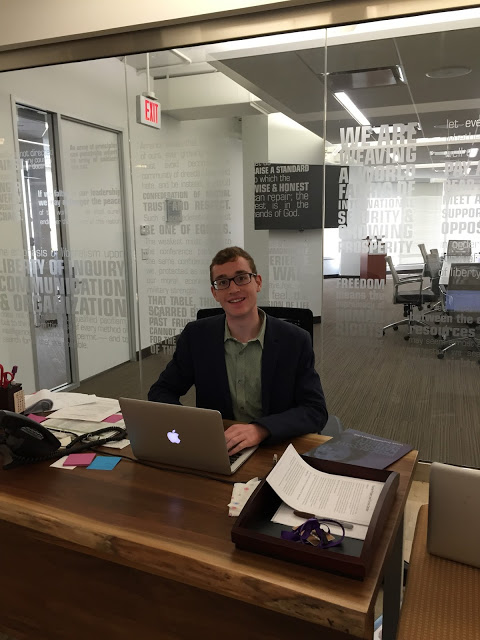- Public Policy
- Leadership
- Funding
- News & Events
- About the Center
Back to Top Nav
Back to Top Nav
Back to Top Nav
Back to Top Nav
The Truman Project, where I worked this summer, is a network of foreign policy professionals and veterans seeking to promote progressive national security policy based on shared values. Rather than using a traditional think-tank model, Truman uses a grassroots approach to influence policy. Truman relies primarily on its members – rather than staff – to come up with policy proposals. It facilitates implementation of these proposals by providing its members wit professional development, an off the record platform for networking, message guidance, and a host of other resources. Truman’s role in progressive national security policy has been constantly evolving since its inception. This year, they compiled their first unified list of shared values, known as the Truman Framework. Truman is well positioned to influence the 2016 election.
 |
| Riley Collins '18 at the Truman Project. |
I gained substantive knowledge of the Iran deal through my internship. At Truman’s annual conference, I heard leading experts, Truman members, and one of the deal’s architects explain why America needs the deal. This linked into Truman’s overall mission of promoting more responsible use of American power overseas. Then, on the day the deal went public, I listened in on a private conference call with the White House. The administration’s national security spokesman detailed the intricacies of the deal and its unique benefits. I bolstered this knowledge with my own independent research of the deal.
Getting published was the most rewarding experience of my summer, and at Truman I learned how to translate the technical skills into an opinion piece. Graham West – Truman’s op-ed guru – gave a talk on how to get published. He taught us everything from the basic structure of an op-ed to how to make a pitch at a news outlet. After hearing the talk, I approached Graham with an idea for a piece. He encouraged me to go for it.
To get published, I learned you need a unique perspective on a timely, newsworthy issue. My angle was as a college student and foreign policy intern disappointed with my congressman’s lack of critical analysis on the deal. I took a half-day off of work to attend the House Armed Services Committee hearing on the Iran deal. Predictably, my overly partisan congressman grandstanded during his question period, wasting everybody’s time.
I immediately took to my laptop and began typing. With Graham’s guidance (and a great deal of editing), I finished my piece. He helped me draft an email to the Denver Post, calmed my nerves when their response at first did not come, and celebrated with me when I learned it I would be published.
The reception I received after writing the deal was incredible. All of Truman’s staff congratulated me. The director of Truman’s Colorado chapter emailed me personally and asked for advice on getting future pieces published in the Denver Post. My congressman’s legislative director, whom I met early in the summer when delivering a letter to my congressman, reached out to me and asked if I wanted to meet with my congressman’s Iran expert.
It is empowering to know that my voice was actually heard in public discourse, even though I am only nineteen. I want to continue contributing to the marketplace of ideas through my writing. But more importantly, I have learned that I want to help share this feeling with other young writers.